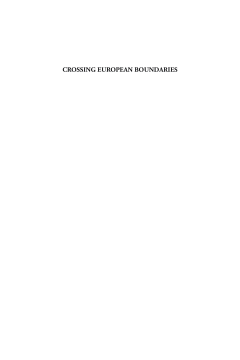
Additional Information
Book Details
Abstract
At the turn of the millennium the state of Europe is fluid and contested, yet how this affects the everyday lives of European peoples and the ways they experience the social world they live in remains largely unexplored. Drawing upon ethnographic information from diverse European settings, this volume points to the contradictions that the project of a "Europe without boundaries" involves. In illustrating how the removal of political boundaries can create other boundaries, the articles in this volume provide alternatives to recent theorising on complexity, which takes little account of human agency.
Jaro Stacul was awarded his Ph.D. in Social Anthropology from the University of Cambridge. He has been a Lecturer in Anthropology at the University of Wales, Swansea, and currently lectures at Roehampton University, London. Berghahn Books also published his The Bounded Field: Localism and Local Identity in an Italian Alpine Valley (2003).
Christina Moutsou received her Ph.D. in Social Anthropology from the University of Cambridge and has been working on Greek-Turkish relations, cosmopolitanism and the European Union. She is Research Associate at the University of Cambridge and a fully qualified psychoanalytic psychotherapist. Currently she is working on the links between anthropology and psychotherapy.
Helen Kopnina was awarded her Ph.D. in Social Anthropology from the University of Cambridge. Currently she lectures at the Vrije Universiteit and the Fashion Institute, Hoogeschool, both in Amsterdam. Her postdoctoral research examines small businesses in Singapore and Malaysia. Her publications include the book East to West Migration (Ashgate 2005).
Table of Contents
| Section Title | Page | Action | Price |
|---|---|---|---|
| Series Page | ii | ||
| Title Page | iii | ||
| Table of Contents | v | ||
| Preface | ix | ||
| CHAPTER 1 CROSSING EUROPEAN BOUNDARIES: BEYOND CONVENTIONAL GEOGRAPHICAL CATEGORIES | 1 | ||
| PART I: INSTITUTIONAL CROSSINGS | 21 | ||
| CHAPTER 2: CROSSING BOUNDARIES THROUGH EDUCATION: EUROPEAN SCHOOLS AND THE SUPERSESSION OF NATIONALISM | 23 | ||
| CHAPTER 3: NEO-LIBERAL NATIONALISM: ETHNIC INTEGRATION AND ESTONIA’S ACCESSION TO THE EUROPEAN UNION | 41 | ||
| CHAPTER 4: THE EUROPEAN LEFT AND THE NEW IMMIGRATIONS: THE CASE OF ITALY | 64 | ||
| PART II: THE EXPERIENCE OF IMMIGRATION | 81 | ||
| CHAPTER 5: THE GRAND OLD WEST: MYTHICAL NARRATIVES OF A BETTER PAST BEFORE 1989 IN VIEWS OF WEST-BERLIN YOUTH FROM IMMIGRANT FAMILIES | 83 | ||
| CHAPTER 6: INVISIBLE COMMUNITY: RUSSIANS IN LONDON AND AMSTERDAM | 103 | ||
| CHAPTER 7: MERGING EUROPEAN BOUNDARIES: A STROLL IN BRUSSELS | 120 | ||
| CHAPTER 8: BOSNIAN WOMEN IN MALLORCA: MIGRATION AS A PRECARIOUS BALANCING ACT | 137 | ||
| PART III: LOCALISING EUROPE | 151 | ||
| CHAPTER 9: CLAIMING THE LOCAL IN THE IRISH/BRITISH BORDERLANDS: LOCALITY, NATION-STATE AND THE DISRUPTION OF BOUNDARIES | 153 | ||
| CHAPTER 10: BOUNDARY FORMATION AND IDENTITY EXPRESSION IN EVERYDAY INTERACTIONS: MUSLIM MINORITIES IN GREECE | 176 | ||
| CHAPTER 11: NEGOTIATING EUROPEAN AND NATIONAL IDENTITY BOUNDARIES IN A VILLAGE IN NORTHERN GREECE | 197 | ||
| CHAPTER 12: CLAIMING A ‘EUROPEAN ETHOS’ AT THE MARGINS OF THE ITALIAN NATION-STATE | 210 | ||
| NOTES ON CONTRIBUTORS | 229 | ||
| INDEX | 233 |
